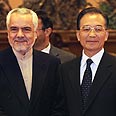
Chinese PM with Iranian VP
Photo: AFP
This week US Secretary of State Hillary Clinton visited the
Gulf States in an attempt to gather support for more severe sanctions against Iran. Her meetings in Saudi Arabia were aimed at putting pressure on Riyadh to use its influence with China in order to get it to support the sanctions.
In recent years China has been improving its economic ties with Saudi Arabia on the basis of oil. Chinese firms are also granted preference for the establishment of factories on Saudi soil, which translates into billions of dollars in annual profit.
What Everyone's Talking About
Ambassador Shalev says if Security Council won't agree on new sanctions for Tehran, individual world powers will have to team up outside Council to punish Iran economically
But it remains to be seen whether Saudi pressure or oil benefits it is able to give Beijing will convince China to toe the line on sanctions, as in recent years the country has increased trade with Iran and its economic interests are now firmly bound to those of the Islamic Republic.
For example, Iran currently exports 448,000 barrels of oil a day to China, which amounts to 15% of the gross.
Trade volume between the two countries has reached at least $36.5 billion, the Iran-China Chamber of Commerce reported, which makes Beijing Tehran's biggest trading partner. Iran mainly imports consumer goods and machinery from China.
The rise in commerce between the partners was made possible by Western countries' abandonment of the oil-rich country due to the sanctions imposed on it. For example, a Chinese firm has replaced France's Total in a widespread natural gas project in southern Iran.
In total, China has earmarked $50 billion in investments in Iranian gas and oil, of which $35 billion has already been invested.
Yin Gang, an expert on Iran at the Chinese Academy of Social Sciences, offers another explanation for China's reluctance in imposing sanctions – namely Beijing's concern that they will go too far, ultimately harming the flourishing economic ties.
"China has economic and trade relations with Iran, so it's natural that China would not want to see regional security and its own national interests affected due to excessive sanctions," Yin said.
In addition, Beijing believes past measures to punish Iran have been largely ineffective, said retired diplomat Hua Liming.
"China and the international community have all seen that the sanctions have not changed Iran's decision to carry on the nuclear program," Hua said.
"On the contrary, sanctions will take the already complex and tense situation in the Middle East to a more dangerous stage, which is something China does not wish to see," he said.
Doron Peskin is chief of the research department at Info Prod Research (Middle East) Ltd.
The Associated Press contributed to this report















